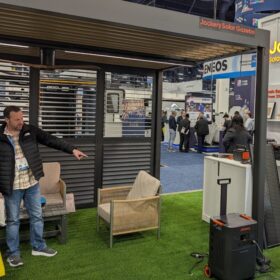California advances flexible demand that can absorb renewable power
With flexible demand appliance standards for pool controls set to take effect in California next year, the state is now developing standards for electric storage water heaters, to be followed by standards for five more types of appliances.
Most states with renewables targets are meeting them
Nearly all states with a renewable portfolio standard have met or nearly met their current standard. Four states have yet to meet their solar carve-out requirements.
Solar+storage microgrids to provide reliability for Northern California tribes
Solar-plus-storage microgrids to be built, owned and operated by three tribes in Humboldt County, California are expected to reduce outages by 90% at a lower cost than undergrounding power lines.
8 GW of solar-plus-storage at resilience hubs in California could save lives
Solar and storage at almost 20,000 community sites across California could help protect its population during power outages, especially during heat and smoke events, a study found.
Six states offer grants to help local governments automate solar permitting
Solar trade groups in Washington, Colorado and Minnesota advocated for grant programs to speed permitting for rooftop solar, using software such as SolarAPP+. Three other states also offer grants, with two requiring automated permitting.
A path to 20 GW of distributed solar in New York
Accelerating deployment of rooftop and community solar with supportive policies would help New York meet its goal of 70% renewable power by 2030 at lower cost, says a solar trade group.
DOE offers conditional loan guarantee for 200 MW solar, 285 MW storage in Puerto Rico
Two solar-plus-storage projects in Puerto Rico eligible for a loan guarantee would double the territory’s utility-scale solar capacity.
Grid operator PJM to start talks on regional transmission
The nation’s largest grid operator told renewables trade groups that it will launch a transmission planning process ordered by the Federal Energy Regulatory Commission.
Protecting smart inverters from cyberattack
The National Institute of Standards and Technology has flagged a cybersecurity risk for smart inverters, and is developing guidelines to prevent cyberattacks.
Louisiana allows firms to buy 500 more MW of renewable power
Louisiana’s large electricity customers will be allowed to purchase up to 500 MW of renewable power through a new type of agreement with renewable project owners.















